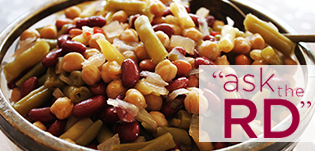If you find that your body responds to “healthy foods” with gas or bloating, the likely culprit is fiber. The vegetables and whole grains that dietitians almost invariably recommend are rich in fiber, which can cause gas in people who aren’t accustomed to eating much of it. If you find yourself sensitive when changing your eating habits to include more fibrous foods, our first piece of advice is to take a “low and slow” approach: start with small amounts and gradually increase fiber levels to the recommended amounts (25 or 38 grams each day for women and men, respectively). In most cases, the body will eventually adapt to tolerate a high-fiber diet without any digestive issues.
Another solution that may help remedy gas is consuming a source of probiotics. By rebalancing the amounts of “good” vs. “bad” bacteria in your digestive tract, you can decrease inflammation and potentially reduce gas. Try a supplement, or include food sources like yogurt, kimchi, and sauerkraut.
The most notorious gas-producing foods are beans, onions, cruciferous vegetables (including broccoli, cabbage and cauliflower) and leafy greens. But it’s important to recognize that everybody is unique; the specific foods that cause gas for one person may not be a problem for you at all. Pay attention to your symptoms! If you struggle to identify your personal gas-triggering foods, keeping a journal can help in discovering patterns. A registered dietitian can help work with you to get to the bottom of your digestive issues!

